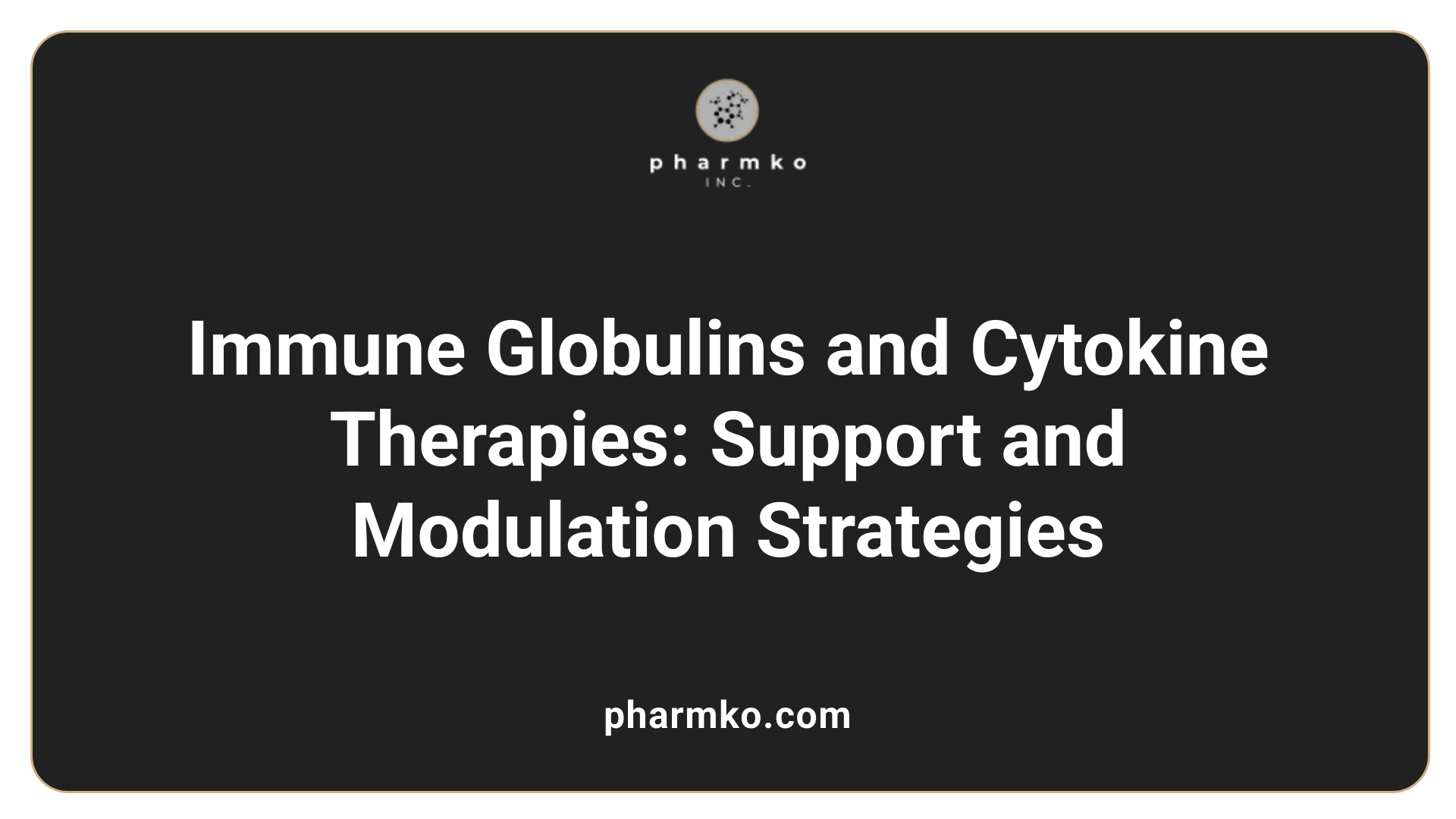Specialty medications for immune support
Understanding the Landscape of Immune Support Medications
The realm of immune support encompasses a diverse array of medications designed to modulate, suppress, or enhance the immune system. These specialty medications are vital in managing a spectrum of conditions, including autoimmune diseases, immune deficiencies, and inflammatory disorders. As research progresses, new therapies and formulations now offer more targeted and personalized treatment options, improving outcomes and quality of life for patients worldwide.
Categories and Mechanisms of Immunosuppressive Drugs

What are the main categories of immunosuppressive drugs used in medical treatment?
Immunosuppressive drugs are essential in managing autoimmune diseases and preventing organ rejection after transplantation. These medications fall into several broad categories, each targeting different components of the immune system.
The main groups include:
- Glucocorticoids : such as corticosteroids, which broadly suppress immune cell activity and inflammation.
- Protein-based agents : like monoclonal and polyclonal antibodies designed for lymphocyte depletion.
- Small molecule drugs : including calcineurin inhibitors such as cyclosporine and tacrolimus, and mTOR inhibitors like sirolimus, which inhibit specific pathways to prevent immune cell activation and proliferation.
- Antimetabolites : such as azathioprine and mycophenolate mofetil, which inhibit DNA synthesis, reducing the growth of immune cells.
- Biologic agents : targeted therapies like anti-IL-1, anti-TNF, and anti-CD20 drugs, which interfere with specific pro-inflammatory cytokines or deplete particular immune cell populations.
These classifications reflect the diverse mechanisms by which they modulate the immune response, either by depleting immune cells, blocking specific cytokine signals, or halting cell cycle progression.
How do these drugs work?
The mechanisms behind these drugs are as varied as their classifications. Corticosteroids suppress multiple immune pathways, decreasing cytokine production and immune cell migration. Biological agents like anti-TNF or anti-IL-1 biologics block specific cytokines that drive inflammation.
Antimetabolites obstruct DNA and RNA synthesis, primarily affecting rapidly dividing immune cells like T and B lymphocytes. Calcineurin inhibitors prevent T-cell activation by blocking signaling pathways essential for their function. mTOR inhibitors interfere with cell cycle progression, reducing immune cell proliferation.
In addition, B-cell depleting agents such as rituximab target CD20 on B cells, leading to their destruction and reducing antibody-mediated responses.
Uses in transplantation and autoimmune diseases
The primary goal of these drugs is to prevent organ rejection in transplant recipients by suppressing the immune response against foreign tissue. They are also extensively used to treat autoimmune conditions like rheumatoid arthritis, lupus, psoriasis, and inflammatory bowel disease.
In transplantation, immunosuppressants reduce the risk of rejection by dampening the immune system’s attack on the transplanted organ. In autoimmune diseases, these drugs inhibit the abnormal immune activity that causes tissue damage. The choice of drug depends on the specific condition, targeted immune pathways, and the patient’s overall health.
| Drug Category | Common Medications | Primary Use | Mechanism of Action |
|---|---|---|---|
| Glucocorticoids | Prednisone, methylprednisolone | Autoimmune diseases, Organ rejection | Broad suppression of cytokine production and immune cell migration |
| Calcineurin Inhibitors | Cyclosporine, tacrolimus | Transplantation, Autoimmune diseases | Inhibit T-cell activation by obstructing calcineurin pathway |
| mTOR Inhibitors | Sirolimus, everolimus | Transplantation | Block T-cell proliferation by inhibiting mTOR pathway |
| Antimetabolites | Azathioprine, mycophenolate mofetil | Autoimmune conditions, Transplantation | Inhibit DNA/RNA synthesis in immune cells |
| Biological Agents | Rituximab, infliximab, adalimumab | Autoimmune diseases, Transplantation | Deplete specific immune cells or block cytokines |
This classification and understanding of mechanisms help guide therapeutic choices tailored to individual patient needs.
Treatment Approaches and Specialist Involvement

What types of healthcare specialists treat immune system disorders?
Managing immune system disorders often requires a team of specialized healthcare providers. Immunologists are the primary specialists involved in diagnosing and managing these conditions. They are experts in immune system function, autoimmune diseases, and allergies, and they develop personalized treatment plans based on individual patient needs.
In addition to immunologists, other specialists play crucial roles depending on the affected organs or specific symptoms. Rheumatologists focus on autoimmune diseases like rheumatoid arthritis and lupus, while dermatologists treat skin-related immune conditions such as psoriasis and eczema. Gastroenterologists handle autoimmune disorders impacting the digestive system, like Crohn’s disease and ulcerative colitis.
Neurologists may be involved when immune issues affect the nervous system, as in multiple sclerosis. Endocrinologists are key in managing autoimmune endocrine disorders such as type 1 diabetes. These specialists have advanced training and provide targeted care to improve patient outcomes.
Evaluation and diagnostic procedures
Diagnosing immune system disorders involves various tests that help identify inflammation, autoantibodies, and immune activity. Common evaluation tools include erythrocyte sedimentation rate (ESR), high-sensitivity C-reactive protein (Hs-CRP), and antinuclear antibody (ANA) tests.
These diagnostics guide clinicians in confirming the presence of autoimmune activity, determining disease severity, and tailoring treatment strategies. For persistent or complex symptoms, comprehensive approaches—sometimes involving biopsies, imaging, and immune profiling—are used.
Interdisciplinary management
Given the complexity of immune-mediated diseases, interdisciplinary care is essential. Patients often consult multiple specialists for holistic management, coordinating treatments that may include immunosuppressants, biologics, and supportive therapies.
Such collaborative efforts ensure that all aspects of the disease are addressed, from symptom control to preventing organ damage. Regular monitoring and adjustments, along with patient education, help optimize quality of life and disease outcomes.
| Specialist Type | Focus Area | Typical Conditions Managed | Additional Notes |
|---|---|---|---|
| Immunologist | Immune system function | Autoimmune diseases, allergy management | Central figure in immune disorders |
| Rheumatologist | Joints, connective tissues | Rheumatoid arthritis, lupus | Often collaborates with immunologists |
| Dermatologist | Skin conditions | Psoriasis, eczema | Provides targeted skin treatments |
| Gastroenterologist | Digestive system | Crohn’s, colitis | Manages autoimmune impacts on GI tract |
| Neurologist | Nervous system | Multiple sclerosis | Addresses neurological autoimmune issues |
| Endocrinologist | Hormonal glands | Type 1 diabetes | Focuses on autoimmune endocrine disorders |
Continued interdisciplinary management and precise diagnostics are vital to effectively treat and improve outcomes for patients with immune system disorders.
Medications That Support and Modulate the Immune System
 Various medications are utilized to support and modulate the immune system, addressing different immune-related conditions. One prominent category is immune globulin therapy, which involves administering antibodies to bolster immune responses in individuals with immune deficiencies. These include primary immunodeficiency disorders such as congenital agammaglobulinemia, common variable immunodeficiency, and Wiskott-Aldrich syndrome.
Various medications are utilized to support and modulate the immune system, addressing different immune-related conditions. One prominent category is immune globulin therapy, which involves administering antibodies to bolster immune responses in individuals with immune deficiencies. These include primary immunodeficiency disorders such as congenital agammaglobulinemia, common variable immunodeficiency, and Wiskott-Aldrich syndrome.
Immune globulins are usually given via subcutaneous injections or infusions, often under medical supervision. Many patients or caregivers learn to self-administer these treatments at home, with the aid of healthcare providers. To enhance the effectiveness and absorption of immune globulin therapies, recombinant human hyaluronidase injections may be used to increase tissue permeability.
In addition to immunoglobulin therapy, other immune-supporting treatments include vaccines designed to stimulate specific immune responses. Cytokine therapies, such as interferons, can boost immune cell activity and are employed in various infections and autoimmune conditions. Conversely, certain immunosuppressants are used to dampen overactive immune responses in autoimmune diseases or to prevent organ rejection after transplantation.
The selection of these medications depends on the patient's underlying condition, overall health, and specific immune needs. All immune-modulating therapies require careful prescription and continuous monitoring by healthcare professionals to ensure safety and maximize effectiveness.
Supporting information on immune therapies can be found by searching for terms like "immune support medications," "immune modulation therapies," "immunoglobulin therapy," and "cytokine treatments." This helps in understanding the evolving landscape of immune-related treatments available today.
Management Strategies for Inflammatory and Autoimmune Conditions

What are common treatments for immune deficiencies and autoimmune disorders?
Patients suffering from immune deficiencies and autoimmune diseases often require a combination of therapies to control symptoms and prevent complications. Immunoglobulin therapy, which supplies essential antibodies, plays a crucial role in managing immune deficiencies by helping the body fight infections.
For autoimmune conditions, immunosuppressive drugs such as corticosteroids, methotrexate, and azathioprine are widely used to broadly reduce immune system activity. These medications help decrease inflammation and tissue damage but may come with increased risk of infections.
Biologic agents have revolutionized autoimmune treatment by targeting specific parts of the immune response. Anti-TNF drugs like infliximab and adalimumab block tumor necrosis factor, a cytokine involved in inflammation. Other biologics target cytokines such as IL-6, IL-17, or IL-23, and surface proteins like CD20, exemplified by rituximab, which depletes B cells.
Supportive medications such as pain relievers, anti-inflammatory drugs, and hormone therapies are essential for symptom relief and improving quality of life. Additional approaches include infection prevention measures like antibiotics, stem cell transplantation, and gene therapy aimed at correcting genetic defects underlying certain immune deficiencies.
While advancements offer significant benefits, many autoimmune diseases remain incurable, and treatments focus on managing disease activity and minimizing side effects. Personalization of therapy based on individual patient needs is vital for optimal outcomes.
Innovations and Future Directions in Autoimmune Therapy

What are current advancements in treatments for autoimmune diseases?
Recent progress in autoimmune disease treatments focuses on innovative therapies that are more precise and effective. Researchers are exploring cell and gene therapies, such as CAR T-cell therapy, which have shown promising results in clinical trials for conditions like systemic lupus erythematosus (SLE), inflammatory myositis, and systemic sclerosis.
These therapies involve genetically modifying T cells to target and eliminate harmful B cells, potentially leading to remission and resetting the immune system. Early results indicate minimal side effects, making these approaches highly promising.
In addition, precision-engineered methods using CRISPR technology are being developed. These involve creating chimeric autoantigen-T cell receptors that can specifically identify and destroy self-reactive immune cells, while sparing healthy cells. This approach aims to eliminate the root causes of autoimmune responses.
Another exciting development includes enzyme-based therapies that neutralize overactive antibodies in diseases like myasthenia gravis. By targeting and neutralizing specific pathogenic antibodies, these treatments can offer highly effective and focused intervention.
Overall, these advancements mark a shift toward personalized, targeted therapies with the potential to not only control symptoms but potentially cure autoimmune diseases, significantly improving patient outcomes.
The Future of Immune Support and Autoimmune Therapy
The landscape of specialty medications for immune support is evolving rapidly, driven by breakthroughs in biologics, cell therapy, and precision medicine. Targeted therapies now offer hope for more effective and less invasive management of autoimmune diseases and immunodeficiencies. As ongoing research continues to uncover new modalities and refine existing treatments, patients can anticipate increasingly personalized approaches that aim not only to control symptoms but potentially to induce remission or cure. Collaboration among healthcare providers, researchers, and specialized pharmacies like Amber Specialty Pharmacy ensures that patients have access to these cutting-edge therapies, supported by comprehensive care and innovative delivery methods. Ultimately, the future of immune support medicine holds promise for transforming the outlook for millions living with immune-related conditions.
References
- Immunosuppressive Meds for Autoimmune Treatment
- Immunology & Inflammatory Diseases | Amber Specialty Pharmacy
- Immunology - Brigent Specialty Pharmacy
- Specialty Drugs by Condition
- CVS Specialty Drug List
- Inflammatory Conditions Specialty Drug Trend - CarelonRx
- Auto-Immune Conditions Treated with Biologics
- Specialty Drugs - Pharmacy - Tricare
- Conditions & Treatments - AmeriPharma® Specialty Care
- Autoimmune Diseases: Types, Symptoms & Treatments













